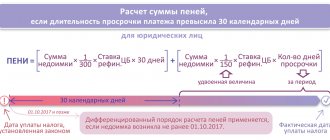In accordance with the current tax legislation, property tax is classified as regional taxes, representing a stable source of income for the budgets of the Russian Federation.
Chapter 30 of the Tax Code is devoted to the procedure for imposing property taxes.
The tax base is determined by taxpayers independently in accordance with this chapter.
Property tax is levied on movable and immovable property, including property:
- transferred for temporary possession, use, disposal, trust management,
- contributed to joint activities,
- received under a concession agreement,
accounted for on the balance sheet as fixed assets in the manner established for accounting.
Payers of this tax are not only Russian organizations, but also foreign companies, in the case of:
- carrying out their activities in the Russian Federation through permanent missions ,
- if they own real estate on the territory of the Russian Federation.
The tax period for property tax is a calendar year.
The following tax reporting periods are recognized:
- first quarter,
- half a year
- nine month
calendar year.
The Tax Code stipulates that the laws of the constituent entities of the Russian Federation establish:
1. Reporting periods (in accordance with Article 379 of the Tax Code of the Russian Federation, constituent entities of the Russian Federation have the right not to establish reporting periods).
2. Tax rates for taxes (within the limits established by the Tax Code - not higher than 2.2%, in accordance with Article 380 of the Tax Code of the Russian Federation).
For property tax, differentiated tax rates may be established depending on:
- categories of taxpayers,
- types of property recognized as an object of taxation
3. Procedure and deadlines for tax payment (Article 383 of the Tax Code of the Russian Federation).
4. Etc.
Taxpayers must submit returns and pay tax at:
- location and registration of the taxpayer;
- finding each of its separate divisions with a separate balance sheet;
- location of each piece of real estate;
- registration of the largest taxpayer;
- registration of a permanent representative office of a foreign organization with the Federal Tax Service;
- location of property included in the Unified Gas Supply System.
On January 1, 2013, the Federal Law of November 29, 2012 No. 202-FZ “On Amendments to Part Two of the Tax Code of the Russian Federation” came into force.
Law No. 202-FZ introduced changes to Chapter 30 of the Tax Code of the Russian Federation, which will affect the majority of taxpayers:
- starting from 2013, movable property registered as fixed assets on January 1, 2013 will not be subject .
The article will discuss the changes that came into force on January 1, 2013 and some features of the taxation of property of organizations with comments from the Ministry of Finance.
Taxpayers
Organizational property tax
paid exclusively by companies. It does not apply to entrepreneurs. Moreover, taxpayers are only companies that have property recognized as an object of taxation, that is, taken into account on the balance sheet as fixed assets. Accordingly, if the company does not have such property, then there is no need to submit tax returns to the inspectorate (we recall that previously in such cases it was necessary to submit “zero” returns).
Some types of businesses are exempt from tax. In particular, tax is not paid:
- public organizations of disabled people (in which 80 percent or more of disabled people work);
- companies whose authorized capital consists entirely of contributions from public organizations of disabled people. In this case, the benefit is valid if the company employs at least 50% of disabled people, and their salary is at least 25% of the total wage fund. Moreover, the property of such companies should not be used for the production and sale of excisable goods, mineral raw materials, minerals, as well as other goods specified in the Decree of the Government of the Russian Federation of February 18, 2004 No. 90;
- firms whose sole owners of property are all-Russian public organizations of disabled people - in relation to property used for the needs of culture and art, education, physical culture and sports, healthcare and social security for disabled people. In particular, these may be:
- educational institutions;
- medical institutions;
- recreational sports camps and labor and recreation camps;
- centers, clubs and circles in the field of education;
- specialized prosthetic and orthopedic enterprises;
- bar associations, law offices and legal consultations;
- state scientific centers.
Starting from 2013, the following are also not recognized as subject to corporate property tax:
- objects recognized as objects of cultural heritage (historical and cultural monuments) of the peoples of the Russian Federation of federal significance (clause 3, clause 4, article 374 of the Tax Code of the Russian Federation);
- nuclear installations for scientific purposes, storage facilities for nuclear materials and radioactive substances and radioactive waste storage facilities (clause 4, clause 4, article 374 of the Tax Code of the Russian Federation);
- icebreakers, ships with nuclear power plants and nuclear technology service ships (clause 5, clause 4, article 374 of the Tax Code of the Russian Federation);
- space objects (clause 6, clause 4, article 374 of the Tax Code of the Russian Federation);
- ships registered in the Russian International Register of Ships (clause 7, clause 4, article 374 of the Tax Code of the Russian Federation).
Object of taxation
Firms must pay property tax on the residual value of fixed assets.
Fixed assets include property that the company uses as a means of labor for more than one year (for example, buildings, equipment, computer equipment, vehicles, etc.) or rents out.
The residual value of such property is calculated as follows:
| Residual value of fixed assets | = | The initial cost of fixed assets reflected in accounts 01 and 03 | — | Depreciation on fixed assets reflected in account 02 |
For some fixed assets, depreciation rather than depreciation is charged. These fixed assets are listed in paragraph 17 of PBU 6/01. When calculating tax, the residual value of such property is determined as follows:
| The initial cost of fixed assets reflected in accounts 01 and 03 | Depreciation of fixed assets reflected in off-balance sheet account 010 | Residual value of property |
| — | = |
For non-resident companies of the Russian Federation, real estate located in Russia is taxed on its inventory value according to the BTI.
The types of property on which tax is not paid are established in Articles 374 and 381 of the Tax Code. These include:
Amendments to the Tax Code of the Russian Federation in 2013 regarding property tax.
21.03.2013
Amendments to the Tax Code of the Russian Federation in 2013 regarding property tax. Reflection of changes in the program “1C: Public Institution Accounting 8”
One of the important components of regional budget revenues is property tax. Chapter 30 of the Tax Code of the Russian Federation regulates the procedure for calculating and paying property taxes.
The object of taxation (Article 374 of the Tax Code of the Russian Federation) is movable and immovable property (including property transferred for temporary possession, use, disposal, trust management, contributed to joint activities or received under a concession agreement), recorded on the balance sheet as objects fixed assets in the manner established for accounting.
The following are not recognized as an object of taxation (Article 374 of the Tax Code of the Russian Federation):
- land plots and other environmental management facilities (water bodies and other natural resources);
- property owned by the right of operational management to federal executive authorities, in which military and (or) equivalent service is legally provided for, used by these authorities for the needs of defense, civil defense, security and law enforcement in the Russian Federation;
- (from 01.01.2013) objects recognized as objects of cultural heritage (historical and cultural monuments) of the peoples of the Russian Federation of federal significance in the manner established by the legislation of the Russian Federation;
- (from 01.01.2013) nuclear installations used for scientific purposes, storage facilities for nuclear materials and radioactive substances and radioactive waste storage facilities;
- (from 01/01/2013) icebreakers, ships with nuclear power plants and nuclear technology service ships;
- (from 01/01/2013) space objects;
- (from 01.01.2013) ships registered in the Russian International Register of Ships;
- (from 01/01/2013) movable property accepted for registration as fixed assets from January 1, 2013
Since most government institutions have only the last point, we must take seriously the distinction between movable and immovable property.
According to Article 130 of the Civil Code of the Russian Federation, real estate includes:
- Land
- Subsoil areas
- Everything that is firmly connected to the ground, that is, objects whose movement without disproportionate damage to their purpose is impossible, including:
- building,
- buildings, structures
- objects of unfinished construction.
In addition, immovable things subject to state registration include:
- aircraft and sea vessels,
- inland navigation vessels,
- space objects.
Things not related to real estate, including money and securities, are recognized as movable property (Clause 2 of Article 130 of the Civil Code of the Russian Federation).
Movable property includes all things for which registration is not required, except in cases established by law, namely:
- Vehicles (Clause 3, Article 15 of the Law of December 10, 1995 No. 196-FZ “On Road Safety”).
- self-propelled road construction machines,
- other cars with an internal combustion engine displacement of more than 50 cubic cm. or maximum electric motor power of more than 4 kW.
- Weapons (Articles 12, 13, 15 of the Law of December 13, 1996 No. 150-FZ “On Weapons”)
According to Art. 375 of the Tax Code of the Russian Federation, the tax base for property tax is the average annual value of property recognized as an object of taxation, and property recognized as an object of taxation is accounted for at its residual value, formed in accordance with the established accounting procedure approved in the accounting policy of the organization.
The procedure for determining the tax base (Article 376 of the Tax Code of the Russian Federation) is applicable in relation to:
- property subject to taxation at the location of the organization
- property of each separate division of the organization, which has a separate balance sheet
- each piece of real estate located outside the location of the organization, a separate division of the organization that has a separate balance sheet, or a permanent representative office of a foreign organization
- property included in the Unified Gas Supply System in accordance with Federal Law of March 31, 1999 N 69-FZ “On Gas Supply in the Russian Federation”
- property taxed at different tax rates
The tax period for corporate property tax (Article 380 of the Tax Code of the Russian Federation) is a calendar year. Payment of property tax for organizations is carried out in the form of advance payments - based on the results of reporting periods (quarter, half-year, 9 months), and at the end of the tax period. When establishing a tax, the legislative (representative) body of a constituent entity of the Russian Federation has the right not to establish reporting periods. The tax rate, procedure and terms of its payment are determined by regional legislation taking into account the requirements of the Tax Code of the Russian Federation. The property tax rate cannot exceed 2.2%.
Benefits (Article 381 of the Tax Code of the Russian Federation) for property tax are provided to:
- organizations and institutions of the penal system - in relation to property used to carry out the functions assigned to them
- organizations whose main activity is the production of pharmaceutical products - in relation to property used by them for the production of veterinary immunobiological preparations intended to combat epidemics and epizootics
- organizations - in relation to objects recognized as historical and cultural monuments of federal significance in the manner established by the legislation of the Russian Federation
- organizations - in relation to nuclear installations used for scientific purposes, storage facilities for nuclear materials and radioactive substances, as well as radioactive waste storage facilities
The tax base (Article 376 of the Tax Code of the Russian Federation) is determined by the payer independently as the average annual value of property recognized as an object of taxation, and advance payments are paid based on the average value of property recognized as an object of taxation.
Changes from 01/01/2013 introduced by Federal Law No. 202-FZ dated 29/11/2012 “On Amendments to Part Two of the Tax Code of the Russian Federation” regulate the exclusion from the list of objects of taxation of movable property registered as fixed assets from 01/01/2013 .
Starting with release 15 of the 1C: Public Institution Accounting 8 program, new objects have been added to the functionality to implement these changes:
- Register of information “Property tax rates” (periodic), which, when updating release 1.0.15, is filled with default values only for objects whose card contains a property tax rate (you should check the correctness of the set values)
- Transfer “Procedure for taxation of property”
- Listing “Types of property for calculating property tax”
- Transfer “Registration with the tax authority”
- Processing “Filling out property tax rates” (intended for group filling out property tax rates and other parameters; when processing, fixed assets are selected in the tabular section, for which it is necessary to set the same parameters for calculating property tax)
- Auto-filling of forms “Property Tax Declaration”, “Property Tax Advances”
Processing capabilities “Filling out property tax rates”:
- Possibility to register an object with a different OKATO code
- Possibility to register an object with another tax authority
- Possibility to establish tax benefits
- Possibility of exclusion from the tax base
- Possibility of specifying the features of a real estate property
- Possibility of specifying different OKATO in a share
How to isolate objects from 2013? Indicate “Not subject to taxation” in the information register, and, starting from release 1.0.18, this value will be set automatically for all new arrivals after 01/01/2013. fixed assets, even used ones.
What will be the tax base after 01/01/2013? Real estate, as well as movable property, accepted on the balance sheet as fixed assets before 01/01/2013. Only the residual value of the specified property will be taken into account when auto-filling the “Property Tax Declaration”.
Law No. 202-FZ abolished the property tax benefit provided in accordance with clause 11 of Article 381 of the Tax Code of the Russian Federation in relation to:
- public railway tracks,
- main pipelines,
- power transmission lines,
- structures that are an integral technological part of these facilities
Tax rates determined by the laws of the constituent entities of the Russian Federation in relation to the above property cannot exceed:
- in 2013 - 0.4%,
- in 2014 - 0.7%,
- in 2015 - 1.0%,
- in 2021 - 1.3%,
- in 2021 - 1.6%,
- in 2021 - 1.9%.
The list of property related to these objects is approved by the Government of the Russian Federation.
Number of impressions: 5677
Return to list
The tax base
To calculate the amount of corporate property tax that needs to be paid to the budget for the tax period, you must determine the value of the company's taxable property for this period.
To determine the average value of property for the reporting period, you need to divide the sum of the residual value of the property on the 1st day of each month of the reporting period and the 1st day of the month following the reporting period by the number of months in the reporting period, increased by one.
To determine the average annual value of property, you need to divide the sum of the residual value of the property on the 1st day of each month and the last day of the year by the number of months in the tax period, increased by one.
Tax base for property tax
In accordance with the provisions of Article 375 of the Tax Code of the Russian Federation, the tax base is defined as the average annual value of property recognized as an object of taxation .
In accordance with clause 1 of Article 375 of the Tax Code of the Russian Federation, when determining the tax base, taxable property is taken into account at its residual value, formed in accounting in accordance with:
- legal requirements,
- accounting policies of the organization for accounting purposes.
If depreciation is not provided , then their value for tax purposes is determined as:
- the difference between their original cost and the amount of depreciation, according to depreciation rates for accounting purposes at the end of each tax (reporting) period.
In accordance with paragraph
2 of Article 375 of the Tax Code of the Russian Federation, the tax base for real estate of foreign organizations:
- not operating in the Russian Federation through permanent representative offices,
- not related to the activities of these organizations in the Russian Federation through permanent missions,
the inventory value of the specified objects is recognized according to the technical inventory authorities, as of January 1 of the year, which is the tax period.
Tax calculation procedure
During the year, firms make advance tax payments for each accounting period. At the end of the year, companies finally settle their taxes with the budget.
The amount of tax that must be paid to the budget at the end of the reporting period (quarter, half-year and 9 months) is determined as follows:
| Average property value for the reporting period | X | Tax rate | : | 4 | = | Tax amount for the reporting period |
The amount of tax that needs to be paid to the budget for the entire year is calculated as follows:
| Tax amount at the end of the year | Average property value at the end of the year | Tax rate | Advance tax payments calculated during the year |
| = | X | — |
Please note: regional authorities may establish a different tax payment procedure.
How do companies with separate divisions pay tax?
Tax on property that is listed on the balance sheet of a separate division must be paid at the location of this division.
To do this, separately calculate the tax base attributable to the head office of the company and each of its branches.
To determine the tax base for the head office, calculate the tax base for the company as a whole and subtract the tax base for separate divisions from the resulting value.
Then multiply the tax base for the head office and each separate division by the tax rate in force in the region where they are located.
The company may own real estate located in other regions. Tax on such property must be paid to the budgets of these regions.
How do companies transferred to UTII pay tax?
For some types of activities, a company may be transferred to pay a single tax on imputed income. There is no need to pay tax on the value of property used in these types of activities. Taxes are paid on the rest of the property as usual.
A company can use the same property both in normal activities and in those transferred for payment of UTII. In this case, you only have to pay tax on part of its value. This part is proportional to the revenue from activities not subject to UTII, the total revenue of your company.
If your company has ceased activities subject to a single tax on imputed income, you must pay tax on the property used in this activity at the end of the reporting period.
How do joint venture participants pay tax?
Firms that participate in joint activities (under a simple or investment partnership agreement) can transfer their property to a common cause. Each participant pays tax on such property separately.
Firms may also acquire or create property through joint ventures. Each participant determines the tax on this property in proportion to the value of his contribution to the common cause.
Data on the residual value of the common property and the share of each participant in it on the 1st day of each month must be reported to the partners by the participant who keeps records of the common activities. He must do this no later than the 20th day of the month following the reporting period.
Procedure and deadlines for reporting
Quarterly (unless otherwise provided by the law of your region), submit tax calculations to the tax office, and at the end of the year - a tax return.
Submit tax calculations based on the results of the first quarter, six months, and 9 months within 30 days after the end of each quarter. Submit your tax return for the year no later than March 30 of the following reporting year.
Note!
Regions of Russia cannot independently approve property tax reporting forms.
Calculations for advance payments must be submitted in the form approved in Appendix 4 to the order of the Federal Tax Service of Russia dated November 24, 2011 No. ММВ-7-11/895. At the end of the year, the declaration must be submitted in the form approved in Appendix 1 to the same order.
If your company has separate divisions or real estate in other regions, you must submit tax calculations and declarations to the inspectorate at the location of these divisions and property.
When the benefit is not yet valid
Let's look at some clarifications from the Ministry of Finance.
In relation to movable property registered as fixed assets from January 1, 2013 under a commission agreement concluded with an interdependent party - a commission agent, the customer has the right to apply the benefit under paragraph 25 of Article 381 of the Tax Code of the Russian Federation. The benefit does not apply if the third party (supplier) is interdependent in relation to the commission agent and (or) the customer (Letter of the Ministry of Finance of Russia dated November 3, 2021 No. 03-05-05-01/64423).
Under a construction contract, the contractor independently purchases equipment that requires installation and carries out installation work. Then the finished movable property is transferred to the customer, who is an interdependent party with the contractor. As the Federal Tax Service of Russia indicated in letter No. BS-4-11/12245 dated July 8, 2021, the exemption from property tax established by paragraph 25 of Article 381 of the Tax Code of the Russian Federation does not apply to such movable property.





